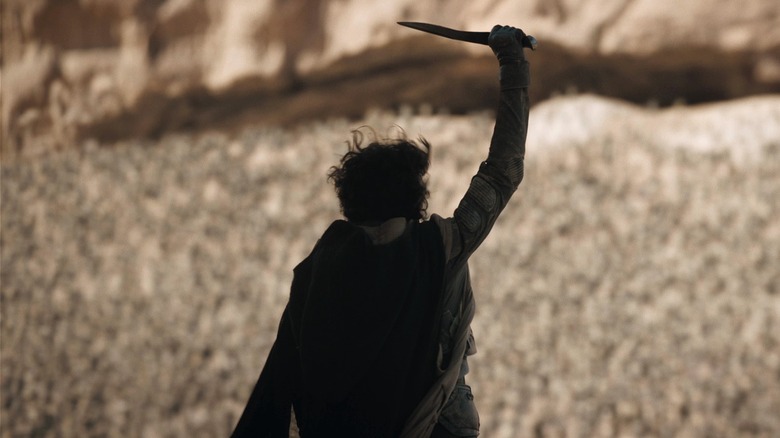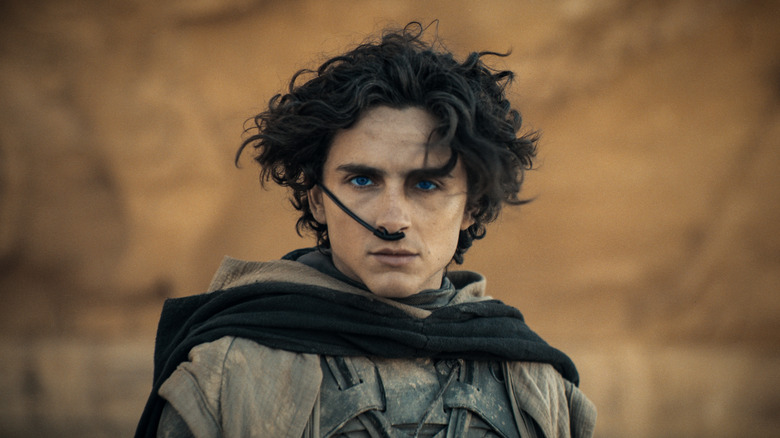Dune's Paul Atreides Has An Absurd Kill Count In The Books
By the end of "Dune: Part Two," it's pretty clear that Paul Atreides (Timothée Chalamet) isn't exactly a heroic figure. He resists his terrible, fated purpose for as long as he can, but after drinking the Water of Life and achieving full prescience, he willingly leads the Fremen in a holy war destined to spread across the known universe. We only see the very beginning of that war in the movie, but those who've read Frank Herbert's "Dune Messiah," the second book in the series, know that the violence and bloodshed reach astronomical levels. When all is said and done, Paul estimates that the war fought in his name has claimed 61 billion lives.
There are some things from the book that "Dune: Part Two" gets wrong, but it hammers home Paul's dark descent quite accurately. Throughout the final act of the film, we hardly ever see him in a personal or intimate way. Instead, we view him the way his followers see him — as a symbol and a military leader. When the other great houses refuse to recognize him as emperor, he tells Stilgar (Javier Bardem) and the rest of the Fremen to "lead them to paradise." It's the language of his own religion, but it's clear in his voice that he knows what he's demanding: all-out war.
Since the totality of this war is explained in detail in Herbert's "Dune Messiah," we also see Paul grappling with his decision to start it. His reasons are always a bit vague because of his prescient powers, but they still reveal some fascinating things about his character.
Why does Paul start the holy war in Dune?
If you've only watched Denis Villeneuve's "" movies and not read the novels, Paul's reason for rallying the Fremen seems pretty straightforward: He needs their strength to defeat the Harkonnens, avenge his father's murder, and free Arrakis. But, of course, it's not that simple. Paul recognizes that side of things for most of "Dune: Part Two," but he still resists. He believes that they can defeat the Harkonnens without him stepping into the role of messiah. It's only after the Water of Life awakens his powers completely that he embraces the myth surrounding him.
This isn't just a rallying cry for the Battle of Arrakeen. In the books, we get a more complete explanation of why Paul changes his mind about the holy war. Through his visions of the future, he determines that no matter how violent the campaign may be, it's still the best path forward for humanity as a whole in the long term. The novels dig a lot deeper into the idea of human genetic longevity – something that Paul believes the war will help address. His full vision of the future and the so-called "Golden Path" he sees through it aren't fully explained until "Children of Dune" and "God Emperor of Dune," however.
The caveat to all of this, as is frequently noted in the "Dune" sequels' epigraphs, is that even for someone with Paul's immense powers, future sight is far from a concrete thing. By the end of his life in the novels, Paul comes to deeply regret his role in the holy war and tries desperately to persuade the Fremen to abandon their faith in him.
How could a Dune Messiah movie handle Paul's kill count?
No matter how massive the scale of your sci-fi story, 61 billion people is a kill count that's impossible to attach to anyone other than a villain. Paul's fall from potential hero to symbol of genocide is the focal point of the first two Dune novels — a commentary on the dangerous nature of hero-worship and messianic figures. If Denis Villeneuve ends up making the "Dune Messiah" film that he's spoken about, he'll have to decide how accurately to portray Paul's violent legacy.
Given how Paul ends "Dune: Part Two," it's likely that a third film would fully embrace the scale of bloodshed described in the books. Seeing the character grapple with the total consequences of his actions on the big screen could be devastating, but Chalamet seems up to the task. It's also possible that a "Dune Messiah" movie could show some part of the holy war up close, something that doesn't happen in the novel. Herbert's book is much shorter and less action-packed than the first "Dune," so it would make sense for Villeneuve to film some actual war scenes to drive home just how bloody Paul's legacy becomes.
"Dune 3" may not arrive in theaters anytime soon, but if and when it does, it has the potential to be the most grotesque and emotionally devastating film in the series. Most of Paul's regret is portrayed through an inner monologue in the book, but a movie could make it tangible in a powerful way.


